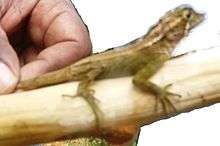Leaf-nosed lizard
| Leaf-nosed lizard | |
|---|---|
 | |
| Scientific classification | |
| Kingdom: | Animalia |
| Phylum: | Chordata |
| Subphylum: | Vertebrata |
| Class: | Reptilia |
| Order: | Squamata |
| Suborder: | Iguania |
| Family: | Agamidae |
| Subfamily: | Draconinae |
| Genus: | Ceratophora |
| Species: | C. tennentii |
| Binomial name | |
| Ceratophora tennentii Günther, 1861 | |
The leaf-nosed lizard or Tennent's leaf-nosed lizard (Ceratophora tennentii) is a species of lizards in the Agamidae family endemic to Sri Lanka.
Description
The arboreal leaf-nosed lizard, also known as the "horn-nosed lizard" or "horned lizard", has a leaf-like appendage on the end of its nose; the species can reach lengths of over 8 in including the tail. Its generic name, Ceratophora, means horn bearer. The males usually have more green in their coloration than females have, although they can change color to a reddish brown. The females usually have shorter appendages on their noses. These lizards are not very agile and rely more on their coloration to avoid predators rather than speed. The lizard is diurnal and therefore is usually only active in the day. Very little is actually known about this unusual lizard.
Head is oval, and longer than wide. Rostral appendage is fleshy, laterally compressed, leaf-like with a blunty conical scale at tip. Lamellae under fourth toe 23-30. Dorsum is reddish brown to olive green. The larger flank scales are more green. Ocular region and sides of neck with dark markings. Tail with 20 dark brown bands. Venter is cream.
Habitat
Found in the wet tropical montane cloud forests of the Knuckles mountains in Sri Lanka at elevations of 760-1220m. They have also been recorded in several other forest habitats.
Diet
The leaf-nosed lizard is reported to feed on insects and other small arthropods.
Reproduction
The leaf-nosed lizard lays eggs and is a sexually reproducing animal.
Threats
Threats to the species include deforestation, pesticides, climate change, forest fires, and bioaccumulation. Much of the leaf-nosed lizards' habitat has been cleared for illegal logging and the cardamom, coffee, tea, and rubber plantations over the past two centuries.
Captivity
As of now, the leaf-nosed lizard is protected because of its endangered status, making its trade illegal.
Conservation efforts
In 2000, areas above 1,067 m above sea level were protected and labeled as conservation forest. Cardamom cultivation had to be abandoned in this area. However, rather than natural regeneration, the cardamom range was taken over by invasive weeds such as mistflower (Eupatorium riparium) and lantana (Lantana camara). The lizard was placed on the endangered list by the IUCN in 2006.
References
- World Conservation Monitoring Centre 1996. Ceratophora tennentii. 2006 IUCN Red List of Threatened Species. Downloaded on 28 July 2007.
- Reptiles Magazine,
- Discovery Communications, LLC. Downloaded on 9 October 2012
